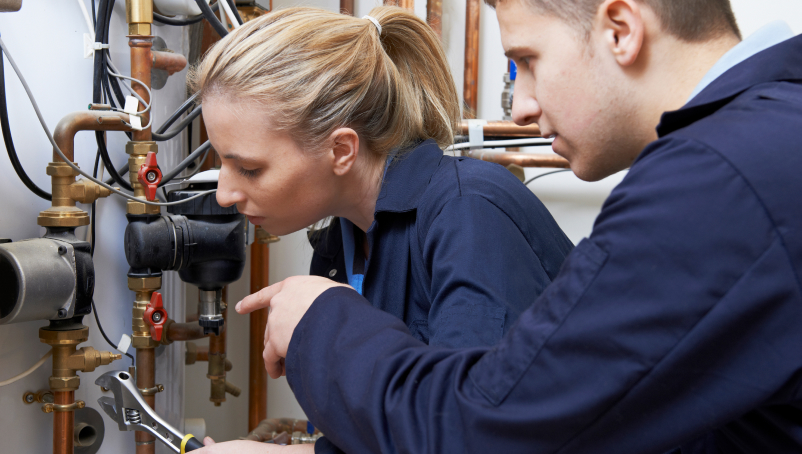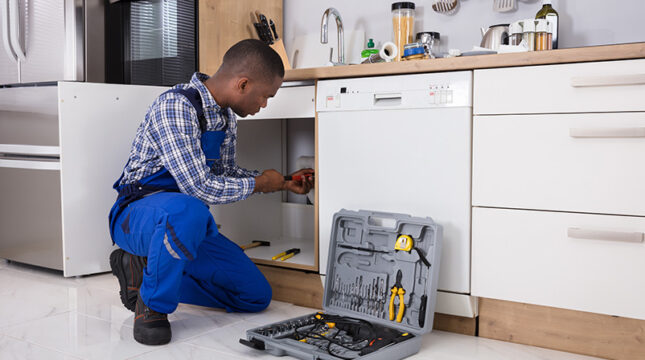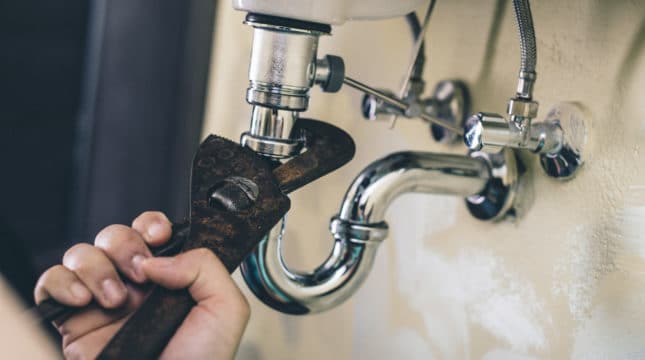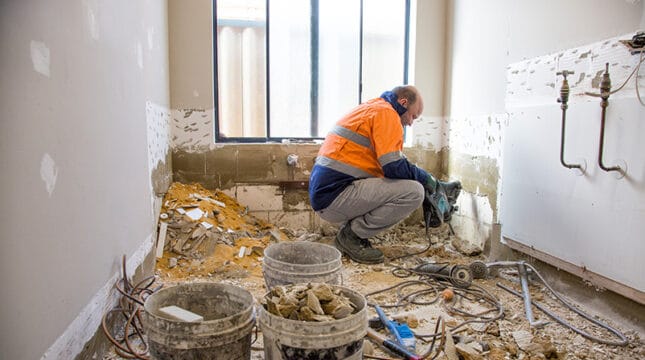Do you need an Oregon plumbing license?
Yes, you need a license to work as a plumber in Oregon. The Oregon State Plumbing Board, under the Department of Consumer and Business Services, handles the licensing of all plumbers in the state. You have a few Oregon plumbing license levels: journeyman plumber, residential water heater installer, solar heating and cooling system installer, and plumbing contractor.
Insurance requirements for an Oregon plumbers license
The right business insurance is a smart way to protect your plumbing business from unexpected problems. While most Oregon plumbing license requirements don’t include insurance coverage, plumbing contractors must have specific policies in place. Here are the plumber insurance types you’ll want to consider to safeguard your finances.
Workers’ Compensation insurance
If you’re a plumbing contractor and your business has employees, the state requires you to have workers’ compensation insurance. This policy helps cover your employee’s medical expenses and lost wages if they get injured on the job.
Learn more about workers’ compensation for contractors.
General Liability insurance
Plumbing contractors must also have general liability insurance to protect your business from third-party claims related to property damage or injuries that happen while you’re working. It can also help protect against personal and advertising injuries.
Learn more about general liability insurance for contractors.
Commercial Property insurance
Commercial property insurance helps protect your office or shop, including your tools and equipment, from covered events such as fire, theft or wind storms. This coverage can include your building structure, products and inventory, furniture and the equipment that you use for work.
Business Owner’s Policy
A business owner’s policy, or BOP insurance, provides broad coverage of general liability and commercial property policies combined in a single, more cost-efficient bundle. That means it can help cover damage that you or your employees may inadvertently cause to another person’s property and help protect your business inventory in the event of a fire or other covered event.
Tools and Equipment insurance
Tools and equipment insurance helps with the cost of repairing or replacing your tools if they get lost, stolen, or damaged.
Commercial Auto insurance
If you use a vehicle for work, such as transporting tools or traveling between job sites, you’ll want commercial auto insurance. This policy helps cover vehicle damages, injuries and liability resulting from work-related accidents.
Oregon plumbing license requirements
If you look at existing Oregon plumbing licenses, you’ll notice that licenses come in different levels depending on your role, from journeyman plumbers to specialized installers. Each has its own set of requirements, and most options require a plumbing exam — but they’re “open book.”
Let’s go through the steps to help you get your plumbing license in Oregon.
Journeyman plumber (JP)
You have two main paths to qualify for the journeyman plumber license. Your first option is to complete a four-year plumber apprenticeship program and get a certificate (or referral letter) from your training committee or an Oregon Plumbing Board-approved program.
If you didn’t do an apprenticeship, you can complete 576 hours of plumbing-related classroom training and put in 7,700 hours of on-the-job experience (split equally between commercial and residential work).
Finally, you’ll need to pass a licensing exam. It’s 64 questions and has a four-hour time limit.
Residential water heater installer (WHI)
Oregon issues limited specialty plumbers licenses if you want to install residential water heaters. You’ll need to be a sole proprietor, a partner in a business, or an officer or employee of a corporation to apply. Plus, you must have an Electrical Limited Specialty (LMS) and a plumbing contractor license (more on that below).
On top of that, you need to finish an eight-hour training program, get the plumbing-electrical contractor you’re working with to sign your application and pass a three-hour, 52-question exam.
Water-treatment installer (WTI)
To become a licensed water-treatment installer in the state of Oregon, you can complete an 18-month apprenticeship program or show proof of 210 hours of formal training along with 3,000 hours of on-the-job experience.
Then, you’ll submit an application and sit for the exam. You get three hours to answer all 52 questions.
Solar heating and cooling system installer (STL)
Solar heating and cooling system installers start by getting 2,288 hours of training — both classroom learning and hands-on work. If you’ve already got 2,000 hours of experience in this field, that works, too. When applying for this Oregon plumbing license, be sure to include your high school diploma or GED, proof of training or work experience, and any other required documents.
After your application is approved, you’ll take a three-hour, 52-question exam.
Plumbing contractor
Oregon’s Building Codes Division (BCD) offers contractor/business license combinations to run a plumbing business. First, make sure to register your business with the Secretary of State and have an active Construction Contractor Board (CCB) license. You’ll also need a full-time licensed signing supervisor on staff.
When you’re ready to apply, include your CCB number, supervisor’s license information, and any other required licenses. Luckily, there’s no exam needed for this license.
How long does it take to get your Oregon plumbing license?
While the state doesn’t specify how long it takes to approve your license application, you can expect your exam results within two weeks. If you meet the Oregon plumbing license requirements and pass the exam, your license will be mailed to you soon after.
Renewing your Oregon plumbing license
For most plumbing licenses in Oregon, renewal happens every three years on April 1. You’ll get a renewal notice about six weeks before your license expires, giving you plenty of time to complete the process.
If you hold a plumbing contractor license, the renewal date is a bit different — it’s every three years on July 1.
Oregon Journeyman Plumber or Solar Heating and Cooling System Installer licenses require continuing education for renewal. Credits vary depending on your license. Water Treatment Installers and Water Heater Installers are exempt.
License reciprocity for plumbing licenses in Oregon
If you have a plumbing license from Idaho or Montana, you can transfer it to Oregon. Head to the BCD reciprocal licensing page to apply. You’ll need to provide a few documents with your application:
- A passport-style photo
- A copy of your current active license
- A history of any violations from the last three years
- A license verification form from the state’s licensing agency
- An affidavit to prove you have 1,000 hours of plumbing work experience
You’ll also submit a $100 application fee to become a licensed plumber by reciprocity in Oregon.





